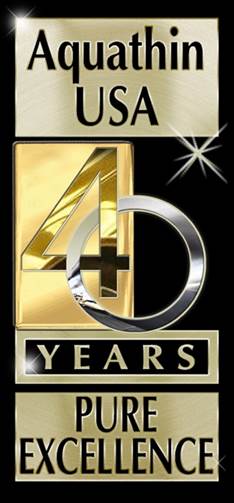Algae toxins found in drinking water.
"Aquathin OP-ED Commentary"
Below is an article from yesterday's local newspaper concerning the endotoxins from algae in ground water sources and how the municipal water treatment plants are not
equiped to remove these carcinogens. The municipal water plants can't---but you can.
One of the most recent concerns came from a hospital in South Africa where my friend, Mr.Gordon Bastiaans, Managing Director of Aquathin South Africa, helped the hospital remove
endotoxins from the Rand Water Authority via an Aqualite TXF and LDI's, for use in their surgical tool autoclaves.
Often Dealers assist clients with treating algae ridden lake water for home use. While chorination with retention is always recommended, chlorine will not oxidize the endotoxin if
present. Your client is protected with your patented RODI systems. You may wish to show these clients this article and this email. As well, drop the article and email to all residents of the lake.
For those members of Aquathin Las Americas, this is an excellent example for the necessity of the AquaShield for preventing the formation of algae in roof top reservour tanks and thus
preventing the potential for endotoxin formation.
Algae toxins found in drinking water.
Algae have left cancer-causing toxins in drinking water that goes to almost 185,000 people in West Palm Beach and three south-west Florida counties, a newspaper reported Sunday.
And biologists don't know how to get the poisons out.
Treated water from a plant on the Peace River tested at five times the World Health Organization's safe level for microcystin.
That tumor-promoting toxin damages chromosomes and causes abnormally small brains in lab tests on mice.
Scientists also measured microcystin at nearly twice the safe level in water flowing to 80,000 residents in West Palm Beach, the Orlando Sentinel reported Sunday.
Microcystin isn't the only algae-produced toxin in Florida drinking water. Three plants on Lake Okeechobee had higher levels of cylindrospermopsin in treated water than the lake itself.
Scientists presumed treating water killed the slime and it's poisons. Now they know filters and chemicals rout algae but not always the toxins.
The biggest question facing scientists: Are small amounts of algal toxins dangerous or fatal to humans over time?
The data comes from a St. Johns River Water Management District study that has yet to be made public.
All these water plants had one thing in common: They draw from surface waters all plagued by algae bloom that usually come and go.
Of the 422 samples scrutinized between February and October 2000, two plants emerged with particularly high levels of toxins - the one on the Peace River and the plant in West Palm Beach.
FOR THE BEST TASTE IN LIFE!
Think Aquathin...AquathinK
Edited from Tech Bank 5/28/01


